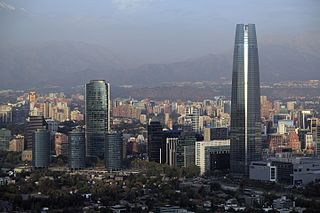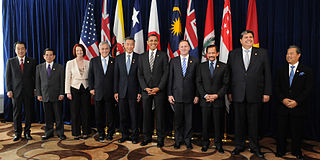Related Research Articles

The economy of Chile is a market economy and high-income economy as ranked by the World Bank. The country is considered one of South America's most prosperous nations, leading the region in competitiveness, income per capita, globalization, economic freedom, and low perception of corruption. Although Chile has high economic inequality, as measured by the Gini index, it is close to the regional mean.

Foreign relations of Kazakhstan are primarily based on economic and political security. The Nazarbayev administration has tried to balance relations with Russia and the United States by sending petroleum and natural gas to its northern neighbor at artificially low prices while assisting the U.S. in the War on Terror. Kazakhstan is a member of the United Nations, Collective Security Treaty Organization, Organization for Security and Co-operation in Europe, North Atlantic Cooperation Council, Commonwealth of Independent States, the Shanghai Cooperation Organisation, and NATO's Partnership for Peace program. Kazakhstan established a customs union with Russia and Belarus, transformed into the Eurasian Economical Community then in 2015 into the Eurasian Economic Union. President Nazarbayev has prioritized economic diplomacy into Kazakhstan's foreign policy.

Singapore maintains diplomatic relations with 188 UN member countries. The exceptions are Burundi, Central African Republic, Monaco and South Sudan.

The economy of Vietnam is a developing mixed socialist-oriented market economy, which is the 36th-largest in the world as measured by nominal gross domestic product (GDP) and 26th-largest in the world as measured by purchasing power parity (PPP) in 2022. Vietnam is a member of the Asia-Pacific Economic Cooperation, the Association of Southeast Asian Nations and the World Trade Organization.

Foreign relations of Australia are influenced by its position as a leading trading nation and as a significant donor of humanitarian aid. Australia's foreign policy is guided by a commitment to multilateralism and regionalism, as well as to build strong bilateral relations with its allies. Key concerns include free trade, terrorism, refugees, economic co-operation with Asia and stability in the Indo-Pacific. Australia is active in the United Nations and the Commonwealth of Nations. Given its history of starting and supporting important regional and global initiatives, it has been described as a regional middle power par excellence.

ASEAN, officially an abbreviation of the Association of Southeast Asian Nations, is a political and economic union of 10 member states in Southeast Asia. It has a population of over 600 million and covers an area of 4.5 million km2 (1.7 million sq mi). ASEAN generated a purchasing power parity (PPP) gross domestic product (GDP) of around US$10.2 trillion in 2022, constituting approximately 6.5% of global GDP (PPP).

The Asia-Pacific Economic Cooperation is an inter-governmental forum for 21 member economies in the Pacific Rim that promotes free trade throughout the Asia-Pacific region. Following the success of ASEAN's series of post-ministerial conferences launched in the mid-1980s, APEC started in 1989, in response to the growing interdependence of Asia-Pacific economies and the advent of regional trade blocs in other parts of the world; it aimed to establish new markets for agricultural products and raw materials beyond Europe. Headquartered in Singapore, APEC is recognized as one of the highest-level multilateral blocs and oldest forums in the Asia-Pacific region, and exerts significant global influence.
A working holiday visa is a residence permit allowing travellers to undertake employment in the country issuing the visa to supplement their travel funds. For many young people, holding a working holiday visa enables them to experience living in a foreign country without undergoing the usual costly expenses of finding work sponsorship in advance or going on expensive university exchange programmes.

The Trans-Pacific Partnership (TPP), or Trans-Pacific Partnership Agreement, was a highly contested proposed trade agreement between 12 Pacific Rim economies: Australia, Brunei, Canada, Chile, Japan, Malaysia, Mexico, New Zealand, Peru, Singapore, Vietnam, and the United States. The proposal was signed on 4 February 2016 but not ratified, being opposed by many Democrats and Republicans, including both major-party presidential nominees, Donald Trump and Hillary Clinton. After taking office, the newly elected President Donald Trump formally withdrew the United States from TPP in January 2017, therefore the TPP could not be ratified as required and did not enter into force. The remaining countries negotiated a new trade agreement called Comprehensive and Progressive Agreement for Trans-Pacific Partnership, which incorporates most of the provisions of the TPP and which entered into force on 30 December 2018.

New Zealand is party to several free trade agreements (FTAs) worldwide.

The Trans-Pacific Strategic Economic Partnership Agreement (TPSEP), also known as P4, is a trade agreement between four Pacific Rim countries concerning a variety of matters of economic policy. The agreement was signed by Brunei, Chile, Singapore and New Zealand in 2005 and entered into force in 2006. It is a comprehensive trade agreement, affecting trade in goods, rules of origin, trade remedies, sanitary and phytosanitary measures, technical barriers to trade, trade in services, intellectual property, government procurement and competition policy. Among other things, it called for reduction by 90 percent of all tariffs between member countries by 1 January 2006, and reduction of all trade tariffs to zero by the year 2015.
The Comprehensive Economic Partnership for East Asia (CEPEA) is a Japanese led proposal for trade co-operation, free trade agreement, among the 16 present member countries of the East Asia Summit. All those movements and efforts were taken over by the following Regional Comprehensive Economic Partnership.

Singapore–United Kingdom relations, also referred to as British–Singaporean relations, are the relations between the states of Singapore and the United Kingdom. Both countries are full members of the Commonwealth of Nations and are marked by historical, cultural, institutional and language ties, extensive people-to-people links, aligned security interests, sporting tournaments, and significant trade and investment co-operation.

The Regional Comprehensive Economic Partnership is a free trade agreement among the Asia-Pacific nations of Australia, Brunei, Cambodia, China, Indonesia, Japan, South Korea, Laos, Malaysia, Myanmar, New Zealand, the Philippines, Singapore, Thailand, and Vietnam. The 15 member countries account for about 30% of the world's population and 30% of global GDP, making it the largest trade bloc in history. Signed in November 2020, RCEP is the first free trade agreement among the largest economies in Asia, including China, Indonesia, Japan, and South Korea.
The negotiations for the Trans-Pacific Partnership Agreement were held between 12 countries between 2008 and 2015. The negotiations were aimed at obtaining an agreement between the Trans-Pacific Strategic Economic Partnership Agreement parties Brunei, Chile, Singapore and New Zealand, as well as the Australia and the United States.

The Comprehensive and Progressive Agreement for Trans-Pacific Partnership (CPTPP), also known as TPP11 or TPP-11, is a trade agreement between Australia, Brunei, Canada, Chile, Japan, Malaysia, Mexico, New Zealand, Peru, Singapore, and Vietnam. It evolved from the Trans-Pacific Partnership (TPP), which was never ratified due to the withdrawal of the United States. The eleven members have combined economies representing 13.4 percent of global gross domestic product, at approximately US$13.5 trillion, making the CPTPP one of the world's largest free-trade areas by GDP, along with the United States–Mexico–Canada Agreement, the European single market, and the Regional Comprehensive Economic Partnership. The United Kingdom formally signed the trade agreement on 16 July 2023 and will join the agreement when it has been ratified by all parties.

South Korea has concluded free trade agreements (FTAs) and other agreements with a trade component with countries around the world and is negotiating with others.
Vietnam, although a relatively young and small nation, has successfully established trade relations with dozens of countries worldwide. This is especially evident in the number of free trade agreements (FTAs) that the country has signed and is participating in. Being part of the Association of Southeast Asian Nations (ASEAN), economic opportunities for Vietnam expands beyond bilateral trade agreements with specific countries to include multilateral trade agreements via the ASEAN Free Trade Area (AFTA).

The accession of the United Kingdom to the Comprehensive and Progressive Agreement for Trans-Pacific Partnership (CPTPP) has been on the current agenda for the enlargement of the CPTPP since 2 June 2021, when the CPTPP Commission decided to move forward with the application of the United Kingdom as an aspirant economy. The United Kingdom officially applied for Comprehensive and Progressive Agreement for Trans-Pacific Partnership membership on 21 February 2021. Accession negotiations were agreed and concluded on 31 March 2023. The UK formally signed the agreement on 16 July 2023. Each of the existing member nations will need to ratify the UK's addition to the partnership before it takes effect. The UK government expects the entry into force to take place in the second half of 2024.
References
- ↑ "Digital Economy Partnership Agreement (DEPA)". Ministry of Trade and Industry (Singapore) . Retrieved December 16, 2020.
- ↑ "UNPACKING THE DIGITAL ECONOMY PARTNERSHIP AGREEMENT (DEPA)". Asian Trade Centre (Singapore). January 28, 2020. Retrieved December 16, 2020.
- 1 2 "Digital Economy Partnership Agreement (DEPA)". Foreign Trade Information System of Organization of American States . Retrieved December 16, 2020.
- ↑ "Singapore, Chile, NZ ink deal to boost digital economy cooperation". The Straits Times . June 13, 2020. Retrieved December 16, 2020.
- ↑ "Building on the modular design of DEPA". East Asia Forum . July 10, 2020. Retrieved December 16, 2020.
- ↑ "Singapore, New Zealand, and Chile inch towards digital economy pact". zDNet . January 21, 2020. Retrieved December 16, 2020.
- ↑ "Singapore signs digital economy partnership agreement with Chile, New Zealand". Business Times (Singapore) . June 12, 2020. Retrieved December 16, 2020.
- ↑ "Korea to officially deliver intention to join DEPA". The Korea Times. 2021-09-12. Retrieved 2021-11-01.
- ↑ "中國申請加入數字經濟夥伴關係協定". hket. 2021-11-01. Retrieved 2021-11-01.
- ↑ "Digital Economy Partnership Agreement Joint Committee Commences Accession Working Group For China".